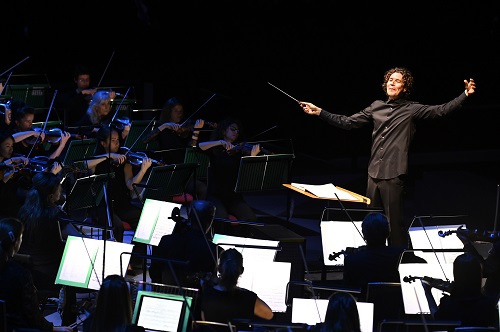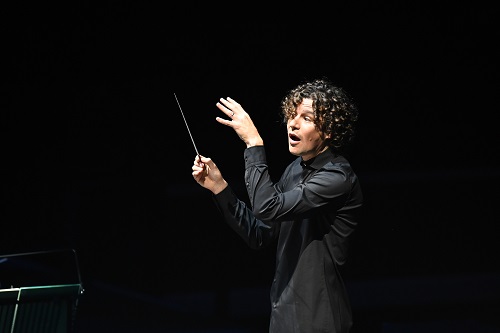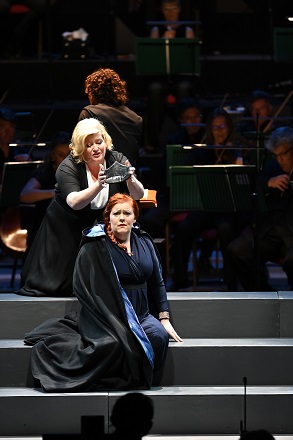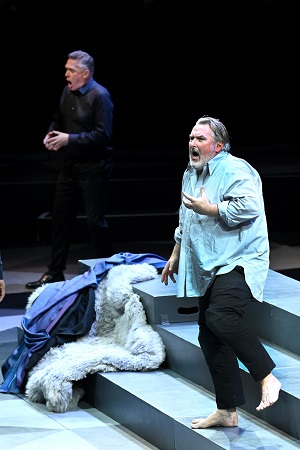I’m often left wondering with a great performance of Tristan und Isolde whether the true emotion of the work comes from the orchestra rather than the singers. There were moments during this concert when the London Philharmonic reached such heights of ecstasy in their playing – the astonishing prelude to the music of the love theme which we will later hear in Act II – when you wondered if anything could excel the sheer beauty or opulence of the sound. And yet it did. Wagner deliberately brings even more excessive beauty to the music which will later become the Liebestod; the LPO certainly played it this way, for example, shaped by a conductor, Robin Ticciati, who makes the music smoulder with unrestrained eroticism.
None of the singing really matched the orchestra throughout the entire evening. If you wanted to look to or hear a great solo in this performance you needed to go to a flute, a cor anglais, or a bass clarinet and to the magnificent colours and contours that leapt from the score. Perhaps it sounds this way because Ticciati is so in love with the orchestra and what it can do. You detect this from the beginning; the compelling sweep the cellos have in the prelude, a momentum you want the conductor to keep as the orchestra swells and surges only for it to run out of steam or for Ticciati to suddenly choke it to a halt. He does this so infrequently that when it happens it makes it stand out all the more. One wondered during the Liebesnacht exactly who was in control of the tempo: Ticciati or his Tristan and Isolde. It really didn’t feel like the former. But, did it ultimately matter? The LPO sounded astounding here – incredibly burnished, glorious even, almost as if they were on fire around the lovers. On the other hand, when he took complete control of matters the results could be thrilling. The end of Act II was wonderful; it had tension and drama and he had whipped up a hurricane of fury before the Liebesnacht, too.

Only Ticciati’s Act III prelude, with neither elements of grief nor despair, left an underwhelming impression – although perhaps you need to have the weight of both experience and age to pull this powerful music off. At the moment Ticciati has neither – although perhaps, just perhaps, the tentative opening could be down to circumstances beyond his grasp. T hat same sudden shift wrong-footed Ticciati during Tristan’s madness. How different it would probably have sounded if Simon O’Neill hadn’t withdrawn at the beginning of Act III; instead, the stand-in, Neal Cooper, sounded fresher and less devastating as Ticciati drove the orchestra into a kaleidoscope of symphonic delirium.
In a sense, Simon O’Neill had been pushing his voice through much of the first two acts. Perhaps it was inevitable this Tristan wouldn’t last the course, although so much that had come before had been impressive. I’m not sure he is a natural Heldentenor – but then the Royal Albert Hall is the most unforgiving acoustic for Wagnerian singers. Robin Ticciati never allowed the London Philharmonic to overwhelm his singers. As Ticciati amply showed, you can breathe fire into a performance, whip strings up into a frenzy until they are cracking the resin on their bows and get the brass to sound as sharp as the swing of an executioner’s axe and yet still have voices emerge with complete clarity. The love duet was exquisite for precisely this reason.

You do sometimes wonder when casting a Tristan and an Isolde whether the voices will be in balance. James King found himself underpowered by a significantly stronger Eileen Farrell in a rare performance of Act II he performed in Boston, for example. There were no problems with the voices in this concert, at least in terms of proportion. Miina-Liisa Värelä’s Isolde – as so often with Nordic sopranos who have sung this role – was troublesome at the bottom of the register whilst having little difficulty reaching her top notes. Such clarity in the orchestra was not mirrored in Värelä’s Isolde which, at best, was muddy – although I admit where you were sat in the hall may have had some impact on this, especially if a singer turned to the opposite direction from where you were sat in the stalls, for example. She is an undoubtedly imposing soprano but as so often with Isolde it’s the Brangäne who you wish would have been cast. Karen Cargill, following the example of Christa Ludwig, should probably never attempt the role of Isolde. Her beautifully expressive, entirely all-knowing singing, with an eye to Wagner’s chromatic colours and the link between the music and the text, showcased what a ‘Liebestod’ would have sounded like from Cargill rather than the dense and icily chilled one we got from Värelä. Imposing as this Isolde looks on stage it can’t somehow mask the fact she is far from invincible – and by the time she gets to the ‘Liebestod’ beginning to flag.

John Relyea was a King Marke of some stature, the stentorian Chinese bass-baritone Shenyang an able and far too gentle singer to border on the thuggish which can sometimes be the standard for Kurwenal. Neal Cooper’s Melot was really superseded by his Act III Tristan.

I am not entirely sure what would have happened to this performance had Cooper not been in the cast – and had he not just sung his first Tristan recently in New Zealand. A spare Tristan or two, lying around London at 8.30pm on a Tuesday evening, would surely not be something we had a lot of I should imagine. What we got is certainly not the Act III Tristan that was intended, and I think we should largely assume was pretty much entirely unrehearsed as well. In the circumstances it was delivered superbly, although we won’t quite know in what musical context. Simon O’Neill acted the role of Tristan on stage and there didn’t always feel a distinct symbiosis between what Neal Cooper was singing and what O’Neill was acting – but it hardly mattered. Freed from the shackles of a purely concert performance, O’Neill certainly had greater freedom to give us a more tragic Tristan; a Tristan actually on the brink of (multiple) death (s). His Isolde, however, did indeed feel shackled. I think Neal Cooper’s singing came closer to dream rather than delirium, those long monologues pressed into something more intense rather than driven towards hysteria. It was perhaps intended to feel underwhelming because it couldn’t be played any other way.
All great performances of Tristan und Isolde are fallible creations, built on at least one near-perfect part. Here, everything was suspended around an orchestra at the height of its powers – one of the great operatic orchestras with spellbinding playing, luminosity of textures, beauty of tone and intensity of emotion. Elsewhere it fell short; but with its orchestra and conductor this Tristan rose to epic heights.
Marc Bridle
Glyndebourne Festival Opera
Richard Wagner: Tristan und Isolde (concert performance)
Tristan – Simon O’Neill (Act I and II), Neal Cooper (Act III), Isolde –Miina-Liisa Värelä, Brangäne – Karen Cargill, Kurwenal – Shenyang, King Marke – John Relyea, Melot – Neal Cooper, Shepherd/Young Sailor –Stuart Jackson, Steersman – John Mackenzie-Lavansch; Director – Daniel Dooner, Stage director – Paul Higgins, Conductor – Robin Ticciati, London Philharmonic Orchestra, Glyndebourne Festival Opera Chorus
Royal Albert Hall, London; Tuesday 31st August 2021.
ABOVE: Simon O’Neill (c) BBC/Chris Christodoulou